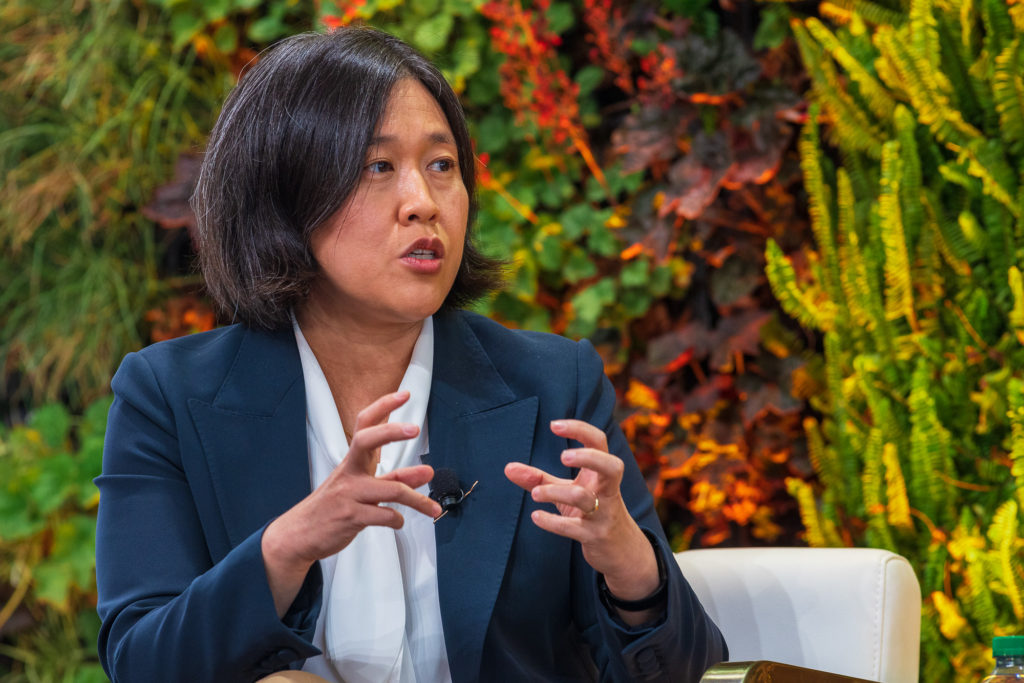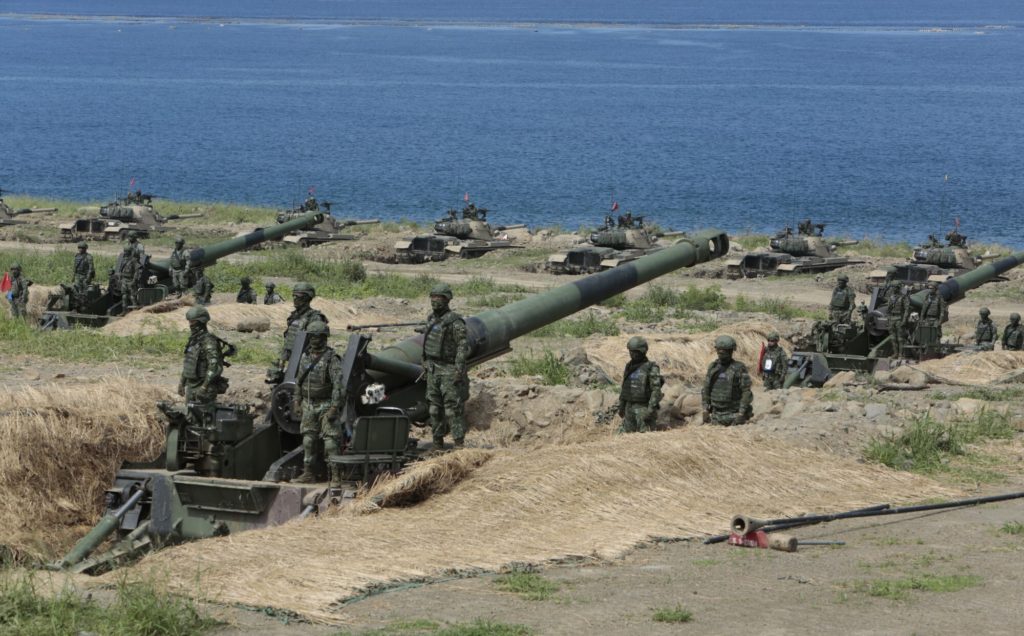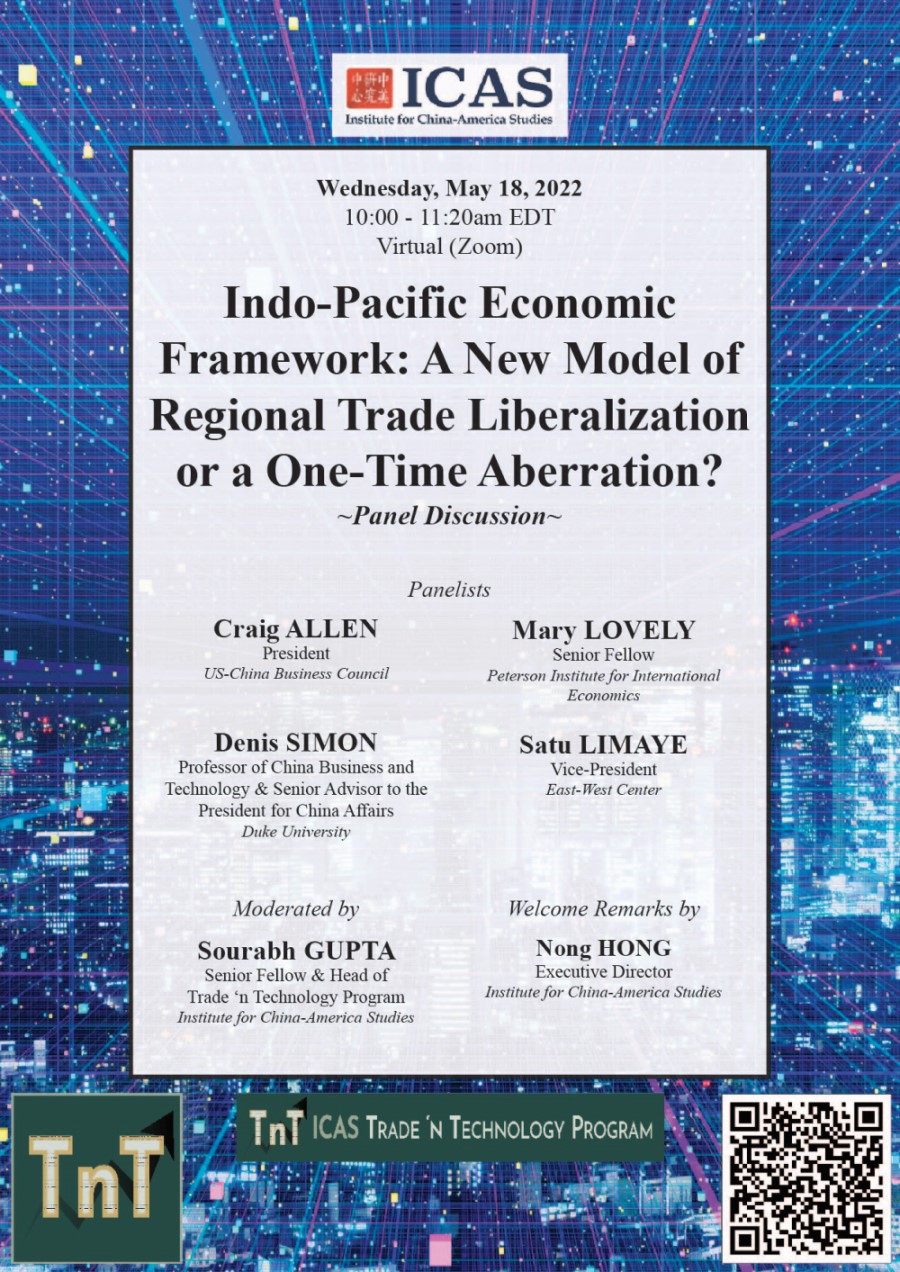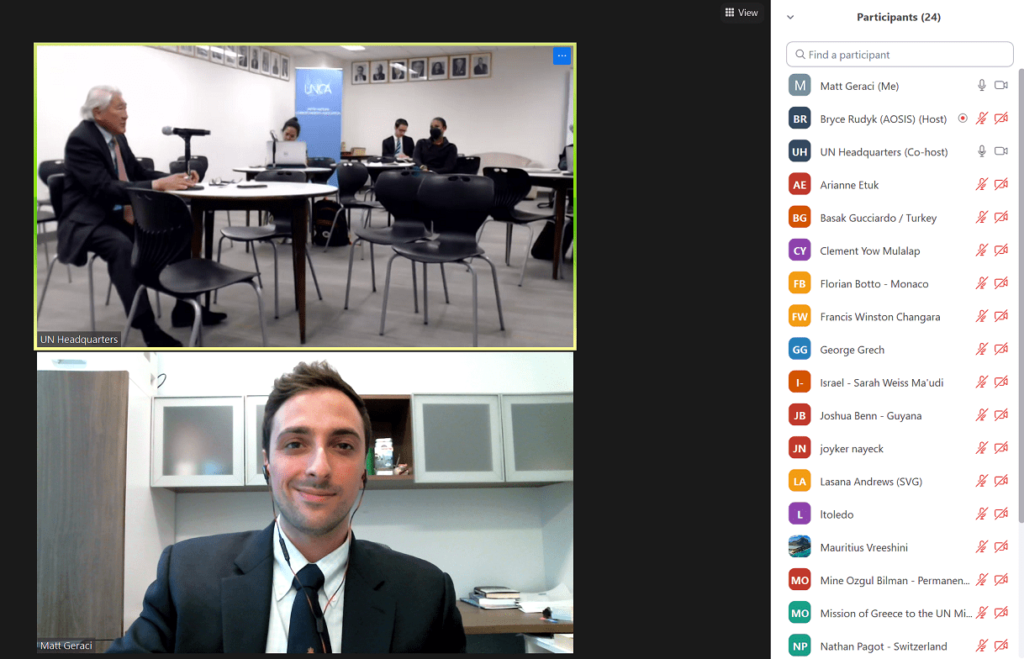
ICAS Bulletin (online ISSN 2836-3418, print ISSN 2836-340X) is published every other week throughout the year at 1919 M St NW, Suite 310, Washington, DC 20036.
The online version of ICAS Bulletin can be found at chinaus-icas.org/bulletins/.

– U.S. regulators from the Public Company Accounting Oversight Board have traveled to China to discuss a potential compromise on audit disclosures that would halt 270 delistings of Chinese companies on the New York exchanges.
– On May 4, the SEC added over 80 firms, many of them Chinese, to a list of entities that may be expelled from American stock exchanges for failing to comply with auditing standards for three years in a row.
– On May 3, Didi Global, a hugely popular Chinese ride-hailing firm, revealed it is facing an SEC probe about its US$4.4 billion IPO in New York as the company is looking to exit the NYSE and is also facing scrutiny from Chinese regulators over its compliance with Chinese law.
– Chinese regulators held an emergency meeting on April 22 with both domestic and foreign banks in order to discuss how assets could be protected from US sanctions if a similar response to the Russia-Ukraine conflict is made against China.
– The U.S. and China are currently discussing a potential audit deal that may be signed later this year in order to keep Chinese companies listed on U.S. exchanges. China has historically denied access to U.S. auditing inspections, citing national security reasons.
Associated News Sources:
“U.S., Chinese regulators in talks for audit deal”, Reuters, May 7 [Paywall]
“US watchdog heads to Beijing to resolve audit stand-off”, Financial Times, May 6 [Paywall]
“SEC adds China’s JD.com to list of over 80 firms facing delisting risk”, Reuters, May 5 [Paywall]
“Didi Global, China ride-hailing giant, reveals it faces an SEC probe about its NYSE IPO, on top of Beijing’s scrutiny and looming delisting”, South China Morning Post, May 4 [Paywall]
“U.S. trade chief Tai says all tools on table to beat inflation, tariffs not top of list”, Reuters, May 2 [Paywall]
“China meets banks to discuss protecting assets from US sanctions”, Financial Times, April 30 [Paywall]
“China, U.S. discussing audit deal plan as delistings loom”, Reuters, April 29 [Paywall]

– The Biden administration will conduct a review of tariffs on over $300 billion of Chinese imports that are set to expire in July. USTR Katherine Tai indicated the review will collect industry comments during this period as part of the determination on whether to extend the tariffs.
– The Treasury and Commerce Departments have split with USTR on how to address the tariffs on Chinese imports. Both Treasury and Commerce are in favor of easing tariffs to address inflation while USTR argues they are important leverage for negotiations with China.
– The U.S. trade deficit with China hit a record $109.8 billion in March 2022 as imports have risen drastically due to the easement of supply chain issues related to the pandemic coupled with increased demand due to price shocks created by the ongoing Russia-Ukraine conflict.
– On May 4, the U.S. Senate began formal legislative talks on how to fund the CHIPS for America Act, which will provide $52 billion in domestic semiconductor chips manufacturing subsidies. President Joe Biden has accused China of lobbying attempts to oppose the legislation.
– The Office of the USTR included China again on its annual Special Section 301 Report, which indicated that “China continues to be the largest origin economy for counterfeit and pirated goods.”
Associated News Sources:
“USTR Tai says China tariff review will have ‘robust’ industry consultations”, Reuters, May 5 [Paywall]
“U.S. Trade Deficit Widens to Record $109.8 Billion as Imports Surge”, The Wall Street Journal, May 4 [Paywall]
“U.S. Senate moves to launch formal talks on massive China competition bill”, Reuters, May 4 [Paywall]
“Biden Officials Divided Over Easing China Tariffs to Slow Inflation”, The Wall Street Journal, May 3 [Paywall]
“Biden Accuses China Trying to Meddle With Competition Bill”, Bloomberg, May 3 [Paywall]
“U.S. Takes First Step Towards Four-Year China Tariffs Review”, Bloomberg, May 3 [Paywall]
“China’s manufacturers remain key to global supply chain, producers ‘ even more dependent’ on world’s factory”, South China Morning Post, April 29 [Paywall]

– Following a U.S. Department of Defense study that found China is exploiting a well-known startup program, the U.S. Congress may soon require government agencies to fully vet technology startups who seek federal funding.
– The Biden Administration is considering adding Chinese surveillance-technology giant Hikvision to the ‘Specially Designated Nationals’ list for its alleged involvement in human rights violations in Xinjiang. While Hikvision is already blacklisted for American consumers, this could expose the company’s global customers to U.S. action.
– Bloomberg reported that Beijing has decided to replace all foreign-branded personal computers in its central agencies and state-backed enterprises with domestic substitutes over the next two years.
– On May 2, the U.S. Food & Drug Administration declined to approve two China-tested cancer treatments by Hutchmed Ltd., Coherus BioSciences Inc., and their Chinese partner Shanghai Junshi Biosciences Co Ltd., addressing needs to test their drugs for the U.S. population in a diverse multi-regional trial.
– China’s Ministry of Commerce seeks to require exporters of products that can have military applications to provide documentation of the intended use in an effort to halt the militarization of sensitive technology.
– Across the United States, solar companies have had to delay more than 300 projects as a result of a decision by the Commerce Department that will investigate whether Chinese companies are skirting U.S. tariffs by moving solar panels through 3rd party countries.
– The U.S. Trade Representative office included China, Russia, Argentina, Chile, India, Indonesia and Venezuela on its annual Special 301 report for lax enforcement of intellectual property rights. It accused China of using its intellectual property laws to unfairly dominate markets and insufficient implementation and enforcement on strengthening patent, copyright and criminal statutes.
– The White House and the U.S. Department of Commerce accused Chinese semiconductor maker Yangtze Memory Technologies Co. of supplying Huawei with memory chips in violation of U.S. export controls.
Associated News Sources:
“Pentagon’s China Warning Prompts Calls to Vet U.S. Funding of Startups”, The Wall Street Journal, May 8 [Paywall]
“White House alarmed that Commerce probe is ‘smothering’ solar industry”, The Washington Post, May 7 [Paywall]
“Beijing To Discard A Whopping 50 Million Computers As US-China Tech War Reaches Crazy Levels”, The EurAsian Times, May 7
“U.S. Considers Unprecedented Sanctions on China Tech Giant Hikvision”, Bloomberg, May 4 [Paywall]
“U.S. FDA declines to approve two more China-tested drugs”, Reuters, May 2 [Paywall]
“China to tighten export controls on dual-use technology”, Nikkei Asia, May 1 [Paywall]
“Solar Industry ‘Frozen’ as Biden Administration Investigates China”, The New York Times, April 29 [Paywall]
“US trade report accuses China of using intellectual property laws to dominate markets”, South China Morning Post, April 28 [Paywall]
“US to probe claims that top Chinese chipmaker violated ban on Huawei”, Financial Times, April 27 [Paywall]
“China, Russia, five others make US property rights blacklist”, AP News, April 27

– After the U.S. State Department removed a line on its website that stated it did not support Taiwanese independence, Beijing accused Washington of “political manipulation.” The change came as US Director of National Intelligence Avril Haines testified before the U.S. Senate that China is working towards conquering Taiwan.
– On May 6, Taiwan’s Defense Ministry reported 18 Chinese warplanes crossing into its air defense identification zone, one of the largest to date.
– Sparked by the Russian invasion of Ukraine, nine current and former U.S. and Taiwanese officials have anonymously confirmed U.S. efforts to help Taiwan prepare for a potential asymmetric war against China.
– On May 5, Taiwan’s Defense Minister Chiu Kuo-cheng signaled the island’s decision to not purchase advanced anti-submarine helicopters from the United States as the price is high beyond the scope of its ability.
– On May 3, Taiwan’s Defense Ministry expressed concerns over the delayed deliveries of shoulder-fired Stinger anti-aircraft missiles from the U.S. as the war intensifies in Ukraine.
– US National Security Council members Kurt Campbell, Indo-Pacific Coordinator, and Laura Rosenberger, China and Taiwan Senior Director, met with UK representatives to express willingness to cooperate and deter Chinese aggression against Taiwan.
– On April 27, The Office of the U.S. Trade Representative released the 2022 Special 301 Report, identifying Taiwan as a market with “notable” levels of streaming content piracy through illicit streaming devices and illicit Internet Protocol Television service apps.
– On April 27, The U.S. House of Representatives passed legislation calling on the State Department to submit a plan to help Taiwan regain its observer status at the World Health Organization, which has since been sent to the White House for Biden’s signature.
Associated News Sources:
“Beijing accuses US of ‘political manipulation’ in latest Taiwan row”, The Guardian, May 10
“U.S. Presses Taiwan to Buy Weapons More Suited to Win Against China”, The New York Times, May 7 [Paywall]
“China makes second largest incursion into Taiwan air defence zone”, Al Jazeera, May 6
“Taiwan says it cannot afford new US anti-submarine helicopters”, Al Jazeera, May 5
“Taiwan flags risk of Stinger missile delays, says pressing U.S.”, Reuters, May 3 [Paywall]
“US-UK talks covered China threat to Taiwan, ‘FT’ says”, Taipei Times, May 2
“U.S. recognizes Taiwan’s efforts to improve trade secrets protections”, Focus Taiwan, April 28
“Bill to help Taiwan regain WHO status passes Congress, sent to Biden for signature”, Reuters, April 27 [Paywall]

– Although China has refused to condemn Russia’s actions in Ukraine and has criticized the sweeping Western sanctions on Moscow, U.S. senior officials said they have not detected overt Chinese military and economic support, contributing to some relief in the tense U.S.-China relationship.
– On April 28, US Navy chief Admiral Michael Gilday addressed at a Center for Strategic and International Studies discussion that a strong response such as incorporating artificial intelligence and unmanned vessels is needed, as the People’s Liberation Army of China evolved at a rapid rate.
– On April 27, Iranian President Ebrahim Raisi expressed his government’s desire for closer cooperation with China to confront U.S. unilateralism during a visit by China’s Minister of National Defense Wei Fenghe.
– On April 27, Chinese Drone giant DJI Technology Co temporarily suspended business in Russia and Ukraine to ensure its products are not used in combat. The company was accused of leaking data on the Ukrainian military to Russia by Ukrainian officials and citizens.
Associated News Sources:
“U.S. relieved as China appears to heed warnings on Russia”, The Japan Times, May 4 [Paywall]
“US Navy chief says ‘phenomenal growth’ in China’s military requires a strong response”, South China Morning Post, April 29 [Paywall]
“Iran seeks to expand its military cooperation with China”, ABC News, April 27
“China’s DJI halts Russia, Ukraine sales to prevent use of its drones in combat”, Reuters, April 27 [Paywall]
“Asia-Pacific stocks slip ahead of China, U.S. inflation data”, CNBC, May 10
“China calls for ‘fair, just’ environment for its companies”, The Times of India, May 10
“More Than Half U.S. Firms in China See Lockdowns Hitting Revenue”, Bloomberg, May 9 [Paywall]
“Marcos presidency complicates US efforts to counter China”, AP News, May 9
“U.S. to announce plans to battle illegal fishing in the Pacific”, Reuters, May 9 [Paywall]
“China ‘unsettled’ by Ukraine war: CIA director”, The Print, May 8 [Paywall]
“Beijing begins fresh round of virus tests as Shanghai postpones crucial exams”, Taipei Times, May 8
“Rubio, Colleagues Introduce Bill to Prevent U.S. Research from Being Used to Benefit the PLA”, Marco Rubio US Senator for Florida, May 5
“Blinken Tests Positive for Covid-19, Delays China Policy Speech”, Bloomberg, May 4 [Paywall]
“China Is Frequent Topic, Especially for GOP, in Midterm Campaign Ads”, The Wall Street Journal, May 2 [Paywall]
“U.S. FDA declines to approve two more China-tested drugs”, Reuters, May 2 [Paywall]
“Climate crisis – not China – is biggest threat to Pacific, say former leaders”, The Guardian, April 28
“Hong Kong and China denounce foreign interference after YouTube blocks leadership candidate’s channel”, Reuters, April 21 [Paywall]

Indo-Pacific Economic Framework: A New Model of Regional Trade Liberalization or a One-Time Aberration?
Wednesday, May 18, 2022
10:00am – 11:20am EDT
Later this May, the Biden administration is expected to unveil the Indo-Pacific Economic Framework (IEPF) – its signature economic and trade cooperation initiative for the Indo-Pacific region. The four-pillared framework will take the form of an “administrative arrangement” that “will not include new market access commitments” but will feature “high-standard outcomes” with a more “consultative” enforcement mechanism. The Framework clearly departs from the existing architecture of economic and trade liberalization in the Asia-Pacific, as represented by the Comprehensive and Progressive Agreement for Trans-Pacific Partnership (CPTPP), the Regional Economic Comprehensive Partnership (RCEP), and the Digital Economy Partnership Agreement (DEPA).
What is the Biden administration’s thinking behind the launch of IPEF? Is the Framework the ‘real deal’ – a meaningful economic and trade liberalization initiative – or is it mostly about telegraphing good intentions of U.S. commitment to the region? How are East and Southeast Asian nations reacting to the Framework’s launch and contents? Is IPEF fit for purpose as a meaningful regional rules-setting undertaking? Or is it primarily a means to de-emphasize – and decouple – the role of China within existing Asian and trans-Pacific supply chains?
On Wednesday, May 18, please join the ICAS Trade ‘n Technology Program virtually for a hybrid expert panel discussion on the Biden administration’s Indo-Pacific Economic Framework and its implications for the United States’ relations in Asia.
On Tuesday, April 26, 2022, ICAS Research Associate Matt Geraci delivered a briefing held at a United Nations seminar for delegates from over 60 UN Missions on how small island states can utilize satellite imagery and GIS applications to demarcate existing land territory and maritime zones.

On Thursday, May 5, 2022, Senior Fellow Sourabh Gupta was quoted by China Daily on the Biden administration’s review of the Section 301 tariffs.
On Sunday, May 1, 2022, Senior Fellow Sourabh Gupta was quoted by South China Morning Post on U.S.-China-Taiwan relations and Beijing’s ‘One China’ policy.

The Institute for China-America Studies is an independent nonprofit, nonpartisan research organization dedicated to strengthening the understanding of U.S.-China relations through expert analysis and practical policy solutions.
1919 M St. NW Suite 310,
Washington, DC 20036
icas@chinaus-icas.org
(202) 968-0595
© 2025 INSTITUTE FOR CHINA-AMERICA STUDIES. ALL RIGHTS RESERVED.